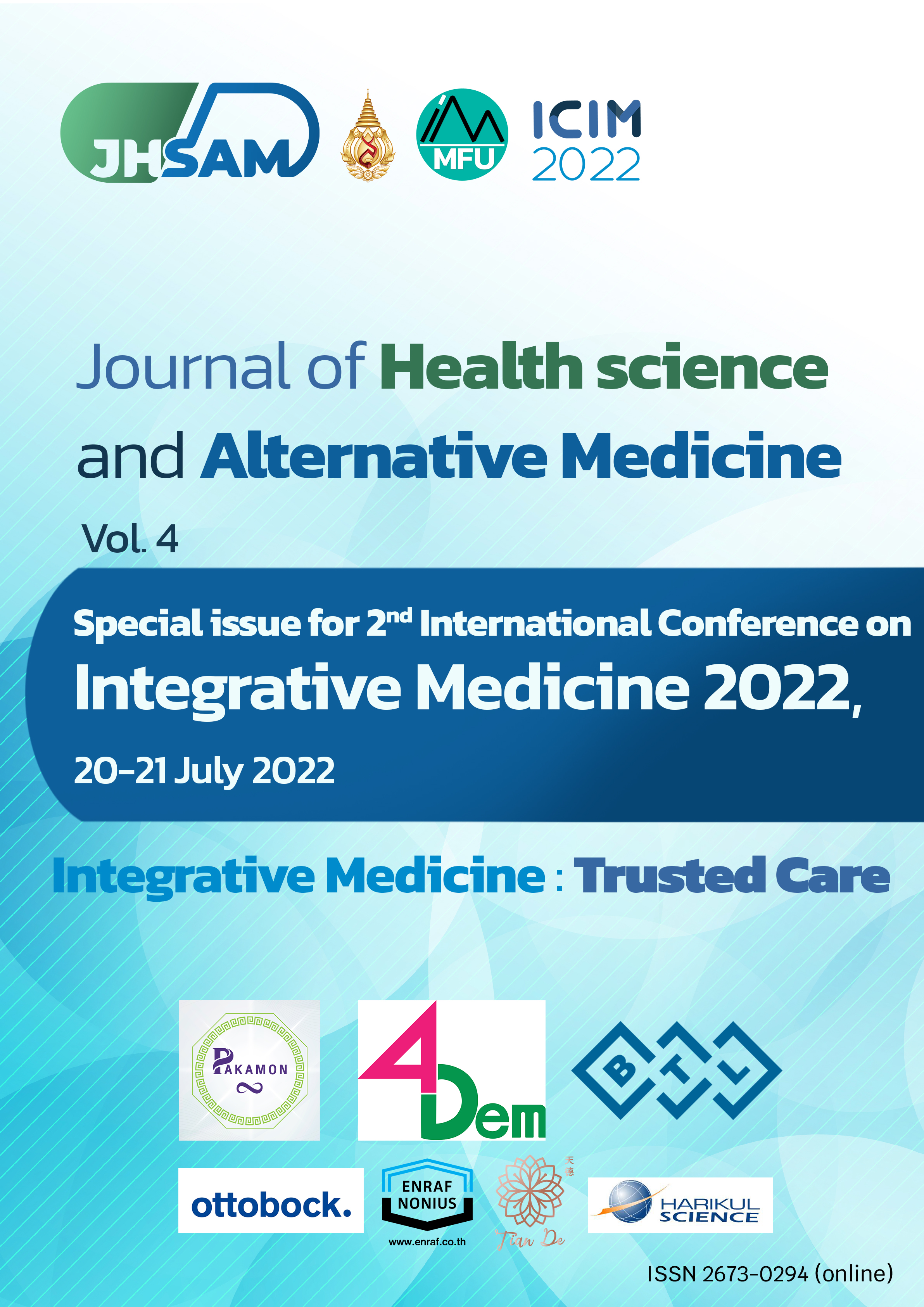C29. Effects of Electroacupuncture on FUNdC1-LC3 Signaling Pathway in Rats Cerebral Ischemia-reperfusion Injury
Main Article Content
Abstract
Objective: To observe the effect of electrotherapy on the FundC1-LC3 signaling pathway in cerebral ischemia reperfusion injury (CIRI) rats and to explore the mechanism of its intervention on CIRI from the perspective of mitochondrial autophagy.
Methods: 24 SD rats were randomly divided into sham operation group, model group and electroacupuncture group. In the electroacupuncture group, electroacupuncture treatment was started 24h after modeling for 30min and lasted for 3 days. The neurological function of the rats was scored before sampling. TTC staining was used to calculate the volume of cerebral ischemia infarction in rats. Western blot was used to detect LC3B and FUNDC1 protein expression in cortical region.
Results: Compared with the sham operation group, the neurological function score of the model group was significantly higher, and the neurological function deficit was serious. LC3B protein expression was increased in cortex, and the differences were statistically significant. Compared with the model group, the neurological function score of the electroacupuncture group was significantly lower, and the neurological function defect was improved. LC3B and FUNDC1 protein expressions were increased in cortical area, and the differences were statistically significant.
Conclusion: Electroacupuncture may promote the FUNDC1-LC3 signaling pathway to up-regulate mitochondrial autophagy and alleviate neurological impairment in rats, thus playing a neuroprotective role.
Article Details

This work is licensed under a Creative Commons Attribution-NonCommercial-NoDerivatives 4.0 International License.
JHSAM publishes all articles in full open access, meaning unlimited use and reuse of articles with appropriate credit to the authors.
All our articles are published under a Creative Commons "CC-BY-NC-ND 4.0". License which permits use, distribution and reproduction in any medium,
provided that the original work is properly cited and is used for noncommercial purposes.
References
高长玉, 吴成翰, 赵建国, et al. 中国脑梗死中西医结合诊治指南(2017)[J]. 中国中西医结合杂志, 2018, 38(02): 136-144.
Wang Y J, Li Z X, Gu H Q, et al. China Stroke Statistics 2019: A Report From the National Center for Healthcare Quality Management in Neurological Diseases, China National Clinical Research Center for Neurological Diseases, the Chinese Stroke Association, National Center for Chronic and Non-communicable Disease Control and Prevention, Chinese Center for Disease Control and Prevention and Institute for Global Neuroscience and Stroke Collaborations[J]. Stroke Vasc Neurol, 2020, 5(3): 211-239.
Watts L T, Lloyd R, Garling R J, et al. Stroke neuroprotection: targeting mitochondria[J]. Brain Sci, 2013, 3(2): 540-60.
Guan R, Zou W, Dai X, et al. Mitophagy, a potential therapeutic target for stroke[J]. J Biomed Sci, 2018, 25(1): 87.
Shin T H, Lee D Y, Basith S, et al. Metabolome Changes in Cerebral Ischemia[J]. Cells, 2020, 9(7).
Singh A, Kukreti R, Saso L, et al. Oxidative Stress: A Key Modulator in Neurodegenerative Diseases[J]. Molecules, 2019, 24(8).
Longa E Z, Weinstein P R, Carlson S, et al. Reversible middle cerebral artery occlusion without craniectomy in rats[J]. Stroke, 1989, 20(1): 84-91.
Rogers D C, Campbell C A, Stretton J L, et al. Correlation between motor impairment and infarct volume after permanent and transient middle cerebral artery occlusion in the rat[J]. Stroke, 1997, 28(10): 2060-5; discussion 2066.
Raefsky S M, Mattson M P. Adaptive responses of neuronal mitochondria to bioenergetic challenges: Roles in neuroplasticity and disease resistance[J]. Free Radic Biol Med, 2017, 102: 203-216.
Yang J L, Mukda S, Chen S D. Diverse roles of mitochondria in ischemic stroke[J]. Redox Biol, 2018, 16: 263-275.
Shao Z, Dou S, Zhu J, et al. The Role of Mitophagy in Ischemic Stroke[J]. Front Neurol, 2020, 11: 608610.
Huang Y G, Tao W, Yang S B, et al. autophagy: novel insights into therapeutic target of electroacupuncture against cerebral ischemia/ reperfusion injury[J]. Neural Regen Res, 2019, 14(6): 954-961.
Wang H, Chen S, Zhang Y, et al. Electroacupuncture ameliorates neuronal injury by Pink1/Parkin-mediated mitophagy clearance in cerebral ischemia-reperfusion[J]. Nitric Oxide, 2019, 91: 23-34.


